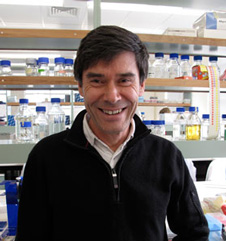
Professor Michael Eccles.
Professor Michael Eccles' project: “Using circular polarised light to evaluate cell differentiation status in vivo” is one of the three inaugural Explorer Grants nationally announced yesterday. Professor Eccles will receive $150,000 over 24 months.
HRC Chief Executive Dr Robin Olds said the grants provide seed support for projects that advance transformative, innovative, exploratory or unconventional ideas, and which have the potential for major impact.
“Our new optical methodology measures increased aggressiveness in cancer cells due to changes that occur in the optical properties of the cells. These changes result from the increasing nuclear to cytoplasm ratio as the cancer cells become progressively less differentiated and more aggressive,” explains Professor Eccles.
In cancer, differentiated tumour cells resemble normal cells and tend to grow and spread at a slower rate. Poorly differentiated tumour cells lack the structure and function of normal cells and grow uncontrollably.
The grant will help Professor Eccles and his colleagues determine whether a circular polarised light method can be used to identify and grade live cancer cells in situ. If successful, the project has the potential to revolutionise techniques used for cancer cell detection and cancer diagnosis.
Professor Eccles is a member of the University's Centre for Translational Cancer Research, which combines major University of Otago research groups in cancer genetics and cancer immunology with leading oncologists and surgeons. It currently consists of over twenty senior scientists and clinicians from the University who cover most fundamental and clinical areas of cancer research.